DAD AND THE CAT AND THE TREE for Class 7 ENGLISH
THEME
Dad and the Cat and the Tree is a funny poem in which the poet describes an over-confident dad who falls repeatedly from the tree while trying to rescue the cat. The only moral we can find in the poem is that we should never be over-confident or else we can get into trouble.
THEME
Dad and the Cat and the Tree is a funny poem in which the poet describes an over-confident dad who falls repeatedly from the tree while trying to rescue the cat. The only moral we can find in the poem is that we should never be over-confident or else we can get into trouble.
EXPLANATION
"Dad and the Cat and the Tree" ek hasye (funny) poem hain jismein kavi ek ati atmvishwas wale father ka varnan karte hain jo cat ko bachane ka prayas karte hue baar-baar tree se niche gir jaate hain. Poem hume yeh sikhati hain ki hume kabhi bhi ati atmvishwas nahi hona chahiye, anytha hum khud ko pareshaani mein daal sakte hain.
EXPLANATION
"Dad and the Cat and the Tree" एक हास्य कविता है जिसमें कवि एक अति आत्मविश्वास वाले पिता का वर्णन करते है जो बिल्ली को बचाने का प्रयास करते हुए बार-बार पेड़ से गिर जाते हैं। कविता हमें यह सिखाती है कि हमें कभी भी अति आत्मविश्वास नहीं होना चाहिए, अन्यथा हम खुद को परेशानी में डाल सकते है।
ABOUT THE AUTHOR
Kit Wright was born in 1944 in Crockam Britain. He is known for being a poet and children’s author. He worked as a lecturer in Canada.
ABOUT THE AUTHOR
Kit Wright was born in 1944 in Crockam Britain. He is known for being a poet and children’s author. He worked as a lecturer in Canada.
EXPLANATION
Kit Wright ka janam 1944 mein Crockam, Britain mein hua tha. Veh ek kavi aur bacho ke lekhak hone ke liye jaane jaate the. Unhone Canada mein lecturer ke roop mein kaam kiya tha.
EXPLANATION
किट राइट का जन्म 1944 में क्रॉकम ब्रिटेन में हुआ था। वह एक कवि और बच्चों के लेखक होने के लिए जाने जाते थे। उन्होंने कनाडा में व्याख्याता (lecturer) के रूप में काम किया था।
STANZA 1
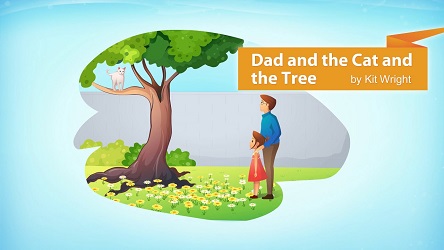
This morning a cat got
Stuck in our tree.
Dad said, “Right, just
Leave it to me.”
STANZA 1

This morning a cat got
Stuck in our tree.
Dad said, “Right, just
Leave it to me.”
IMPORTANT WORDS
Stuck In- Trapped or locked in a particular place, फँस जाना
IMPORTANT WORDS
Stuck In- Trapped or locked in a particular place, फँस जाना
EXPLANATION
Narrator yahan batate hain ki subhe ke samay ek cat tree par fass jaati hain. Unke father ne narrator se kaha ki veh cat ko yahan se bhaga denge.
EXPLANATION
कथावाचक (narrator) यहाँ बताते है कि सुबह के समय एक बिल्ली पेड़ पर फँस जाती हैं। उनके पिता ने कथावाचक से कहा कि वह बिल्ली को भगा देंगे।
STANZA 2

The tree was wobbly,
The tree was tall.
Mum said, “For goodness’
Sake don’t fall!”
STANZA 2

The tree was wobbly,
The tree was tall.
Mum said, “For goodness’
Sake don’t fall!”
IMPORTANT WORDS
Wobbly- Something that is unstable and shaky, कुछ ऐसा जो अस्थिर हो
For goodness’ sake- An exclamation expressing protest, भगवान के लिए
IMPORTANT WORDS
Wobbly- Something that is unstable and shaky, कुछ ऐसा जो अस्थिर हो
For goodness’ sake- An exclamation expressing protest, भगवान के लिए
EXPLANATION
Narrator batate hain ki tree bahut lamba aur asithir tha. Narrator ki mother bahut chintit thi aur unhone apne pati ko chetawni di ki veh gir sakte hain.
EXPLANATION
कथावाचक बताते है कि पेड़ बहुत लंबा और अस्थिर था। कथावाचक की माँ बहुत चिंतित थी और उन्होंने अपने पति को चेतावनी दी कि वह गिर सकते है।
STANZA 3
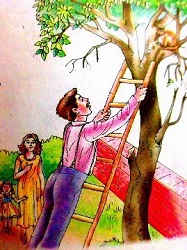
“Fall?” scoffed Dad,
“A climber like me?
Child’s play, this is!
You wait and see.”
STANZA 3

“Fall?” scoffed Dad,
“A climber like me?
Child’s play, this is!
You wait and see.”
IMPORTANT WORDS
Scoffed- Mocking at someone or their idea, हँसी उड़ाना
Child's play- Very easy to do, बहुत आसान
IMPORTANT WORDS
Scoffed- Mocking at someone or their idea, हँसी उड़ाना
Child's play- Very easy to do, बहुत आसान
EXPLANATION
Apni wife ki chetawniyon ko sunkar narrator ke father ko bada ascharye (shock) hua. Unhone in chetawniyon ko yeh kehkar nazarandaaz kar diya ki veh ek ache climber the aur tree par chadna unke liye bacho ke khel jitna asaan tha.
EXPLANATION
अपनी पत्नी की चेतावनियों को सुनकर कथावाचक के पिता को बड़ा आश्चर्य हुआ। उन्होंने इन चेतावनियों को यह कहकर नज़रअंदाज़ कर दिया कि वह एक अच्छे पर्वतारोही (climber) थे और पेड़ पर चढ़ना उनके लिए बच्चों के खेल जितना आसान था।
STANZA 4
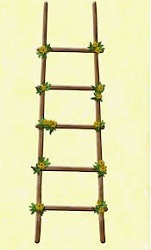
He got out the ladder
From the garden shed.
It slipped. He landed
In the flower bed.
STANZA 4

He got out the ladder
From the garden shed.
It slipped. He landed
In the flower bed.
IMPORTANT WORDS
Landed- Reached the ground, ज़मीन पर गिर जाना
Slipped- to fall, फिसल जाना
IMPORTANT WORDS
Landed- Reached the ground, ज़मीन पर गिर जाना
Slipped- to fall, फिसल जाना
EXPLANATION
Narrator ke father garden ke shed se ladder nikalte hain aur jaise hi veh ladder tree ke sath rakhte hain aur chadne ki koshish karte hain, vaise hi unka per fisal jata hain aur veh zameen par gir jaate hain.
EXPLANATION
कथावाचक के पिता बगीचे के शेड से सीढ़ी निकालते हैं और जैसे ही वह सीढ़ी पेड़ के साथ रखते है और चढ़ने की कोशिश करते है, वैसे ही उनका पैर फिसल जाता है और वह ज़मीन पर गिर जाते है।
STANZA 5
“Never mind,” said Dad,
Brushing the dirt
Off his hair and his face
And his trousers and his shirt,
STANZA 5
“Never mind,” said Dad,
Brushing the dirt
Off his hair and his face
And his trousers and his shirt,
IMPORTANT WORDS
Brushing- Cleaning away dirt and dust by scrubbing, धूल-मिट्टी को हटाना
IMPORTANT WORDS
Brushing- Cleaning away dirt and dust by scrubbing, धूल-मिट्टी को हटाना
EXPLANATION
Narrator ke father apne baalo (hair) aur kapdo se gandgi (dirt) saaf karte hain, aur apna chehra bhi saaf karte hain aur cat ko bhagane ki ek aur yojna ke baare mein sochne lagte hain.
EXPLANATION
कथावाचक के पिता अपने बालों और कपड़ों से गंदगी साफ करते हैं, और अपना चेहरा भी साफ करते हैं और बिल्ली को भगाने की एक और योजना के बारे में सोचने लगते हैं।
STANZA 6

“We’ll try Plan B. Stand
Out of the way!”
Mum said, “Don’t fall
Again, O.K.?”
STANZA 6

“We’ll try Plan B. Stand
Out of the way!”
Mum said, “Don’t fall
Again, O.K.?”
EXPLANATION
Narrator ke father ne dusri yojna (plan) ko azmane ka faisla kiya. Halanki unki wife ne unhe phir se chetawni di ki veh phir se gir sakte hain.
EXPLANATION
कथावाचक के पिता ने दूसरी योजना को आजमाने का फैसला किया। हालांकि, उनकी पत्नी ने उन्हें फिर से चेतावनी दी, कि वह फिर से गिर सकते है।
STANZA 7
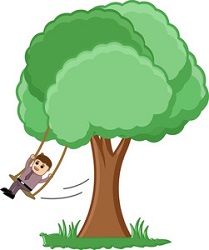
“Fall again?” said Dad.
“Funny joke!”
Then he swung himself up
On a branch. It broke.
STANZA 7

“Fall again?” said Dad.
“Funny joke!”
Then he swung himself up
On a branch. It broke.
IMPORTANT WORDS
Swung- It refers to the act of swinging on a particular place, झूलना
IMPORTANT WORDS
Swung- It refers to the act of swinging on a particular place, झूलना
EXPLANATION
Narrator ke father apni wife ki chetawni ko taal dete hain aur phir veh haste-haste ek daali (branch) par jhulne lagte hain aur veh daali toot jaati hain aur veh phir se zameen par gir jaate hain.
EXPLANATION
कथावाचक के पिता अपनी पत्नी की चेतावनी को टाल देते है और फिर वह हँसते-हँसते एक डाली पर झूलने लगते हैं और वह डाली टूट जाती है और वह फिर से ज़मीन पर गिर जाते है।
STANZA 8

Dad landed wallop
Back on the deck.
Mum said, “Stop it,
You’ll break your neck!”
STANZA 8

Dad landed wallop
Back on the deck.
Mum said, “Stop it,
You’ll break your neck!”
IMPORTANT WORDS
Wallop- Hitting or striking heavily, चोट
IMPORTANT WORDS
Wallop- Hitting or striking heavily, चोट
EXPLANATION
Narrator ke father phir se zameen par gir padte hain. Narrator ki mother unse rukne ke liye kehti hain kyunki baar-baar girne se unki gardan (neck) par chot lag sakti thi.
EXPLANATION
कथावाचक के पिता फिर से जमीन पर गिर पड़ते हैं। कथावाचक की माँ उनसे रुकने के लिए कहती है क्योंकि बार-बार गिरने से उनकी गर्दन पर चोट लग सकती है।
STANZA 9
“Rubbish!” said Dad.
“Now we’ll try Plan C.
Easy as winking
To a climber like me!”
STANZA 9
“Rubbish!” said Dad.
“Now we’ll try Plan C.
Easy as winking
To a climber like me!”
IMPORTANT WORDS
Winking- It refers to something that can be done quickly, in a blink of an eye, आँख मारना
IMPORTANT WORDS
Winking- It refers to something that can be done quickly, in a blink of an eye, आँख मारना
EXPLANATION
Tab narrator ke father ne teesri yojna ko azmane ka faisla kiya. Unhe abhi bhi vishwas tha ki ek mahan climber hone ke naate veh safal honge.
EXPLANATION
तब कथावाचक के पिता ने तीसरी योजना को आज़माने का फैसला किया। उन्हें अभी भी विश्वास था कि एक महान पर्वतारोही होने के नाते वह सफल होंगे।
STANZA 10
Then he climbed up high
On the garden wall.
Guess what?
He didn’t fall!
STANZA 10
Then he climbed up high
On the garden wall.
Guess what?
He didn’t fall!
EXPLANATION
Narrator ke father garden ki oochi (high) divaar par chadh jaate hain aur iss baar veh pedh se nahi girte hain.
EXPLANATION
कथावाचक के पिता बगीचे की ऊँची दीवार पर चढ़ जाते है और इस बार वह पेड़ से नहीं गिरते है।
STANZA 11
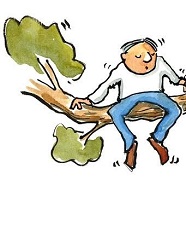
He gave a great leap
And he landed flat
In the crook of the tree-trunk —
Right on the cat!
STANZA 11

He gave a great leap
And he landed flat
In the crook of the tree-trunk —
Right on the cat!
IMPORTANT WORDS
Leap- Jumping quickly from a distance with a force, छलांग
Crook- a curved or hooked part, एक घुमावदार या झुका हुआ हिस्सा
IMPORTANT WORDS
Leap- Jumping quickly from a distance with a force, छलांग
Crook- a curved or hooked part, एक घुमावदार या झुका हुआ हिस्सा
EXPLANATION
Father tree ke ooper chalang lagate hain aur ussi taraf utarte hain jahan cat bethi hoti hain.
EXPLANATION
पिता पेड़ के ऊपर छलांग लगाते है और उसी तरफ उतरते है जहाँ बिल्ली बैठी होती है।
STANZA 12
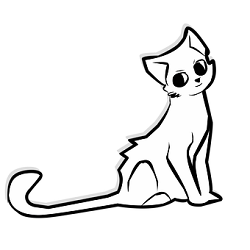
The cat gave a yell
And sprang to the ground,
Pleased as Punch to be
Safe and sound.
STANZA 12

The cat gave a yell
And sprang to the ground,
Pleased as Punch to be
Safe and sound.
IMPORTANT WORDS
Yell- Shouting at someone or something with a loud voice, चिल्लाना
Sprang- Jump, कूदना
Please and Punched- Very pleased, बहुत खुश
Safe and Sound- Unhurt, सुरक्षित
IMPORTANT WORDS
Yell- Shouting at someone or something with a loud voice, चिल्लाना
Sprang- Jump, कूदना
Please and Punched- Very pleased, बहुत खुश
Safe and Sound- Unhurt, सुरक्षित
EXPLANATION
Jaise hi narrator ke father cat ki taraf chalang lagate hain waise hi cat darr se chillakar, zameen par surakshit kood jaati hain. Cat apne aap tree se utarkar bahut khush dikhayi deti hain.
EXPLANATION
जैसे ही कथावाचक के पिता बिल्ली की तरफ छलांग लगाते है वैसे ही बिल्ली डर से चिल्लाकर, जमीन पर सुरक्षित कूद जाती है। बिल्ली अपने आप पेड़ से उतरकर खुश दिखाई देती है।
STANZA 13
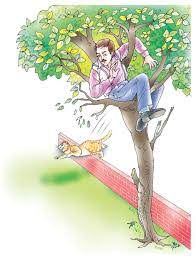
So it’s smiling and smirking,
Smug as can be,
But poor old Dad’s Still
Stuck Up The Tree!
STANZA 13

So it’s smiling and smirking,
Smug as can be,
But poor old Dad’s Still
Stuck Up The Tree!
IMPORTANT WORDS
Smirking- Smiling at someone or something with satisfaction and joy, मुस्कुराना
Smug- Showing much pride in achieving something, आत्मसंतुष्ट
IMPORTANT WORDS
Smirking- Smiling at someone or something with satisfaction and joy, मुस्कुराना
Smug- Showing much pride in achieving something, आत्मसंतुष्ट
EXPLANATION
Narrator batate hain ki cat poori tarah se ahenkaar ke sath muskurati hain, aur asaani se utarne ke liye garv (proud) mehsoos karti hain jabki father ki halat kharab hoti hain kyunki cat ko bachane ke liye veh khud tree par fass jaate hain.
EXPLANATION
कथावाचक बताते हैं कि बिल्ली पूरी तरह से अहंकार के साथ मुस्कुराती है, और आसानी से उतरने के लिए खुद पर गर्व महसूस करती है जबकि पिता की हालत ख़राब होती है क्योंकि बिल्ली को बचाने के लिए वह खुद पेड़ पर फँस जाते है।
SUMMARY
SUMMARY
POETIC DEVICE
1) Personification: It is the attribution of human characteristics to animals and non-living things.
For Example: “it’s smiling and smirking” is used for the cat.
2) Alliteration: It is the repetition of initial consonant sounds in two or more neighbouring words in a phrase or sentence.
For Example: was wobbly”, “tree was tall”, “his hair and his face”, “On a branch. It broke”, “He gave a great leap”, “tree-trunk”, “Pleased as Punch”, “So it’s smiling and smirking”.
3) Repetition: It is the repetition of certain phrases for poetic effect.
For Example: “fall” is repeated several times in the poem.
POETIC DEVICE
1) Personification: It is the attribution of human characteristics to animals and non-living things.
For Example: “it’s smiling and smirking” is used for the cat.
2) Alliteration: It is the repetition of initial consonant sounds in two or more neighbouring words in a phrase or sentence.
For Example: was wobbly”, “tree was tall”, “his hair and his face”, “On a branch. It broke”, “He gave a great leap”, “tree-trunk”, “Pleased as Punch”, “So it’s smiling and smirking”.
3) Repetition: It is the repetition of certain phrases for poetic effect.
For Example: “fall” is repeated several times in the poem.
QUESTION AND ANSWERS
Q1. Why was Dad sure he wouldn’t fall?
ANSWER. The Dad was sure he wouldn’t fall because he was a good climber.
Q2. Which phrase in the poem expresses Dad’s Self-confidence best?
ANSWER. “Right just. Leave it to me.” “Easy as winking to a climber like me.”
Q3. Describe Plan A and its consequences.
ANSWER. Plan A was to climb the tree with the help of a ladder. Although the ladder slipped and Dad fell to the ground.
Q4. Plan C was a success. What went wrong then?
ANSWER. Even though Plan C was a success, it did not work out as planned. The moment the father reached the treetop, the cat jumped and touched the ground and was again out of the father’s reach.
Q5. The cat was very happy to be on the ground. Pick out the phrase used to express this idea.
ANSWER. “Smiling and Smirking” is the phrase that expresses the idea that the cat was very happy to be on the ground.
Q6. Describe the Cat and the Dad situation in the beginning and at the end of the poem.
ANSWER. At the Onset, the cat was stuck on the tree and the father was confident to be able to drive it away. By the time the poem ended, the cat was free and the father got stuck in the tree.
Q7. Why and when did Dad say each of the following?
1) Fall
2) Never mind
3) Funny joke
4) Rubbish
ANSWER. 1) When his wife warned him against falling, the father with a great surprise said “fall?”
2) Having fallen to the ground, the father did not give up and brushing the dirt from his hair and clothes said, “never mind.”
3) When his wife again warned him against falling while he was executing Plan B, he found his wife’s warnings to be a “funny joke.”
4) After the second fall, when his wife intervened saying that he might break his neck, he again dismissed her concern by saying, “rubbish.”
Q8. Do you find the poem humorous? Read aloud lines that make you laugh.
ANSWER. Yes, of course. The poem has a lot of humor in it. It was pretty amusing to see the narrator's father fall over and over again.
(a) “the cat gave a yell/ and sprang to the ground.”
(b) “it slipped. He landed in the flower bed.”
QUESTION AND ANSWERS
Q1. Why was Dad sure he wouldn’t fall?
ANSWER. The Dad was sure he wouldn’t fall because he was a good climber.
Q2. Which phrase in the poem expresses Dad’s Self-confidence best?
ANSWER. “Right just. Leave it to me.” “Easy as winking to a climber like me.”
Q3. Describe Plan A and its consequences.
ANSWER. Plan A was to climb the tree with the help of a ladder. Although the ladder slipped and Dad fell to the ground.
Q4. Plan C was a success. What went wrong then?
ANSWER. Even though Plan C was a success, it did not work out as planned. The moment the father reached the treetop, the cat jumped and touched the ground and was again out of the father’s reach.
Q5. The cat was very happy to be on the ground. Pick out the phrase used to express this idea.
ANSWER. “Smiling and Smirking” is the phrase that expresses the idea that the cat was very happy to be on the ground.
Q6. Describe the Cat and the Dad situation in the beginning and at the end of the poem.
ANSWER. At the Onset, the cat was stuck on the tree and the father was confident to be able to drive it away. By the time the poem ended, the cat was free and the father got stuck in the tree.
Q7. Why and when did Dad say each of the following?
1) Fall
2) Never mind
3) Funny joke
4) Rubbish
ANSWER. 1) When his wife warned him against falling, the father with a great surprise said “fall?”
2) Having fallen to the ground, the father did not give up and brushing the dirt from his hair and clothes said, “never mind.”
3) When his wife again warned him against falling while he was executing Plan B, he found his wife’s warnings to be a “funny joke.”
4) After the second fall, when his wife intervened saying that he might break his neck, he again dismissed her concern by saying, “rubbish.”
Q8. Do you find the poem humorous? Read aloud lines that make you laugh.
ANSWER. Yes, of course. The poem has a lot of humor in it. It was pretty amusing to see the narrator's father fall over and over again.
(a) “the cat gave a yell/ and sprang to the ground.”
(b) “it slipped. He landed in the flower bed.”
EXTRA QUESTIONS AND ANSWERS
Q1. Describe the tone in which the narrator’s father dismissed his wife’s warnings every single time.
ANSWER. When his wife first warned him, he was completely taken aback. He pondered how a skilled climber such as himself could fall. When his wife warned him the second time, he laughed at her, thinking her warning was a joke.
Q2. Discuss plans A, B, and C and the reasons for their respective failures.
ANSWER. In Plan A, with the ladder, father would have climbed to the top of the tree. The ladder, on the other hand, slipped and father dropped to the ground. Then he came up with Plan B. He grabbed the branch and spun himself around. However, the branch broke, and Father fell to the ground. Finally, he came up with Plan C. He considered climbing the garden wall. Even that, however, did not go as planned as the moment the father reached the treetop, the cat jumped and touched the ground and was again out of the father’s reach.
EXTRA QUESTIONS AND ANSWERS
Q1. Describe the tone in which the narrator’s father dismissed his wife’s warnings every single time.
ANSWER. When his wife first warned him, he was completely taken aback. He pondered how a skilled climber such as himself could fall. When his wife warned him the second time, he laughed at her, thinking her warning was a joke.
Q2. Discuss plans A, B, and C and the reasons for their respective failures.
ANSWER. In Plan A, with the ladder, father would have climbed to the top of the tree. The ladder, on the other hand, slipped and father dropped to the ground. Then he came up with Plan B. He grabbed the branch and spun himself around. However, the branch broke, and Father fell to the ground. Finally, he came up with Plan C. He considered climbing the garden wall. Even that, however, did not go as planned as the moment the father reached the treetop, the cat jumped and touched the ground and was again out of the father’s reach.
GLOSSARY
Stuck In- Trapped or locked in a particular place, फँस जाना
Wobbly- Something that is unstable and shaky, कुछ ऐसा जो अस्थिर हो
For goodness’ sake- An exclamation expressing protest, भगवान के लिए
Scoffed- Mocking at someone or their idea, हँसी उड़ाना
Child's play- Very easy to do, बहुत आसान
Landed- Reached the ground, ज़मीन पर गिर जाना
Slipped- to fall, फिसल जाना Brushing- Cleaning away dirt and dust by scrubbing, धूल-मिट्टी को हटाना
Swung- It refers to the act of swinging on a particular place, झूलना
Wallop- Hitting or striking heavily, चोट
Winking- It refers to something that can be done quickly, in a blink of an eye, आँख मारना
Leap- Jumping quickly from a distance with a force, छलांग
Crook- a curved or hooked part, एक घुमावदार या झुका हुआ हिस्सा
Yell- Shouting at someone or something with a loud voice, चिल्लाना
Sprang- Jump, कूदना
Please and Punched- Very pleased, बहुत खुश
Safe and Sound- Unhurt, सुरक्षित
Smirking- Smiling at someone or something with satisfaction and joy, मुस्कुराना
Smug- Showing much pride in achieving something, आत्मसंतुष्ट
GLOSSARY
Stuck In- Trapped or locked in a particular place, फँस जाना
Wobbly- Something that is unstable and shaky, कुछ ऐसा जो अस्थिर हो
For goodness’ sake- An exclamation expressing protest, भगवान के लिए
Scoffed- Mocking at someone or their idea, हँसी उड़ाना
Child's play- Very easy to do, बहुत आसान
Landed- Reached the ground, ज़मीन पर गिर जाना
Slipped- to fall, फिसल जाना Brushing- Cleaning away dirt and dust by scrubbing, धूल-मिट्टी को हटाना
Swung- It refers to the act of swinging on a particular place, झूलना
Wallop- Hitting or striking heavily, चोट
Winking- It refers to something that can be done quickly, in a blink of an eye, आँख मारना
Leap- Jumping quickly from a distance with a force, छलांग
Crook- a curved or hooked part, एक घुमावदार या झुका हुआ हिस्सा
Yell- Shouting at someone or something with a loud voice, चिल्लाना
Sprang- Jump, कूदना
Please and Punched- Very pleased, बहुत खुश
Safe and Sound- Unhurt, सुरक्षित
Smirking- Smiling at someone or something with satisfaction and joy, मुस्कुराना
Smug- Showing much pride in achieving something, आत्मसंतुष्ट